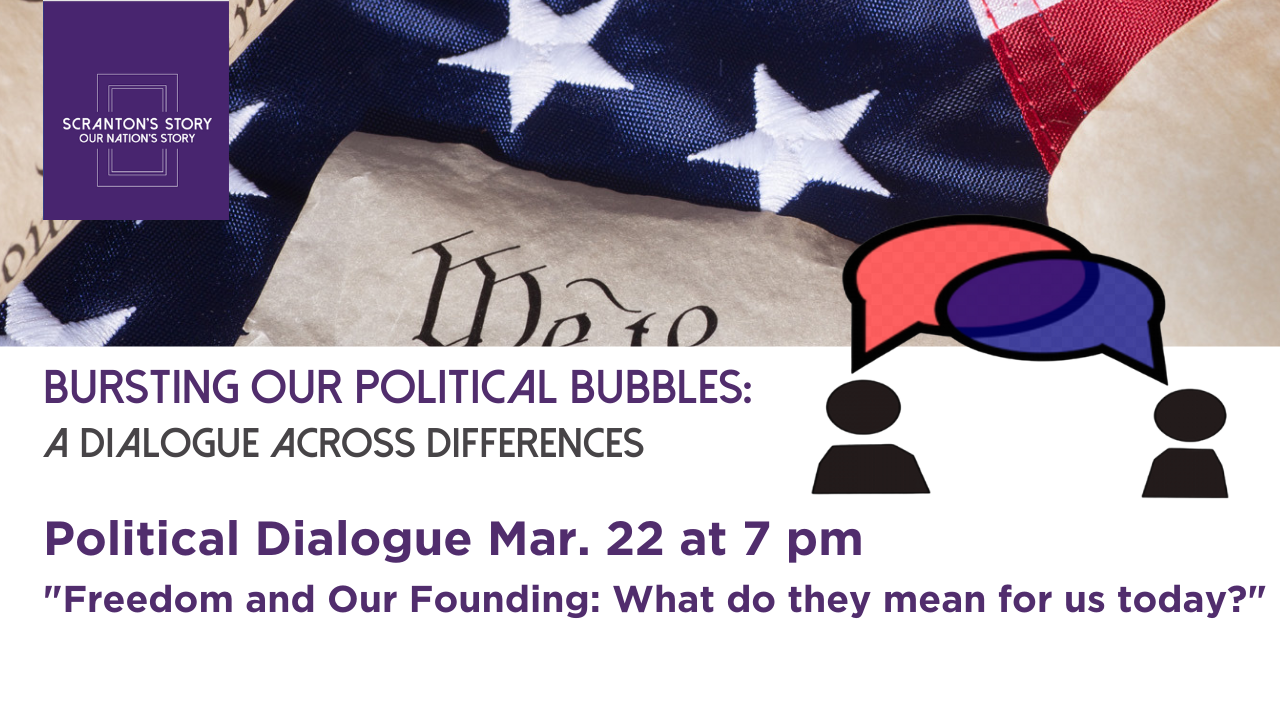Spring Political Dialogue to Focus on Freedom

The University of Scranton’s Political Dialogues Working group in collaboration with various campus and community partners and in conjunction with the “Scranton’s Story, Our Nation’s Story” project will offer a nonpartisan Political Dialogue on “Freedom and Our Founding: What do they mean for us today?” on Tuesday, March 22 from 7 – 8:30 p.m. This dialogue event will offer an opportunity for University students, faculty and staff, and Scranton area community members alike to engage in a nonpartisan open discussion about the foundational concept of freedom.
This dialogue will be held on The University of Scranton campus in The Kane Forum in Edward R. Leahy, Jr. Hall and will involve facilitated small-group structured dialogues that will allow participants to reflect on freedom and the founding along with our role as citizens in a democracy. Participants will have a chance to both share their own experiences and perspectives on issues that relate to freedom and equality today while listening to others’ views and engaging in conversation. Registration for this public dialogue is required at: surveymonkey.com/r/FreedomDialogue2022
The University has organized similar discussions on campus since 2017 as part of an ongoing Dialogue Across Differences Initiative, which blends the reflective, structured dialogue methods of national non-profit Essential Partners with St. Ignatius of Loyola’s teachings of discernment and reflection. For tips on how to have your own constructive dialogue that involves both listening to and learning from others, click here.
This dialogue event is a part of the “Scranton’s Story, Our Nation’s Story” project’s second theme, “The U.S. Citizen and the American Founding,” which focuses on the concept of freedom – both for our founders and for us today. Theme events, hosted by The University of Scranton along with community partners, will engage with the larger questions and concerns surrounding the topic of freedom and our shared democracy as our nation approaches its 250th anniversary.
Theme 2 events began with a Book Discussion on Freedom: An Unruly History on Thursday, Feb. 3 from 5 to 6:30 p.m. Participants reflected on excerpted readings of the book, “Freedom: An Unruly History,” by scholar Annelien de Dijn and shared their own views on the concept of freedom in a discussion led by Dr. Matt Meyer, University of Scranton Philosophy faculty member. Discussion themes included the origin of the concept of freedom along with the relationship between freedom and government, the common good, and rules. This hybrid event was hosted by the Scranton Public Library.
Theme events continued Mar. 1 with a humanities lecture held via Zoom at 5 pm, “Freedom and Our Founding: What do they mean for us today?,” featuring distinguished scholars Annelien De Dijn, author, Freedom: An Unruly History, and Aziz Rana, author, Two Faces of American Freedom. This event explored the evolution of the concept of freedom, how it was understood at the time of our nation’s founding almost 250 years ago, and how we can re-engage with its meaning today. The recording is now available for this event on the project’s playlist within The University of Scranton's YouTube channel here.
For further details including event updates, humanities resources, and information on upcoming themes, please visit the “Scranton’s Story, Our Nation’s Story” project website at scranton.edu/scrantonstory and contact community@scranton.edu with questions.
Follow “Scranton’s Story, Our Nation’s Story” on Facebook and Instagram @ourscrantonstory and on Twitter @scrantonstory.
This project has been made possible in part by the National Endowment for the Humanities: Democracy demands wisdom. Any views, findings, conclusions, or recommendations expressed in these events do not necessarily represent those of the National Endowment for the Humanities.






